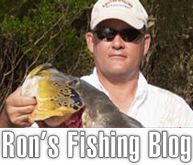Safe Winter Fishing
 [Editor: this article first appeared on www.ronsfishingblog and may only be used by permission of Ron Speed]
[Editor: this article first appeared on www.ronsfishingblog and may only be used by permission of Ron Speed]
Today let’s talk about wintertime fishing, cold water, wind chill, and the safety measures required to keep you safe to fish another day. Without a doubt, wintertime fishing presents some real dangers for the fisherman. Unlike the warm months, the cold water of winter can mean a really dangerous thing if you happen to enter the water unexpectedly. This can happen very quickly from being thrown from the boat by hitting a big wave wrong, to simply losing your balance and falling overboard.
When I started guiding on Toledo Bend Lake back in the late 60’s I had to go to a guide school in Port Arthur, Texas to be certified by the US Coast Guard to obtain a professional guide license. I attended several classes over a few weeks’ time. One of the main things I learned from that school was how quickly hypothermia sets in when the water temps are cold. The colder the water the more quickly the hypothermia sets in.
Of course the real danger–and the real killer–is hypothermia and the stages you go through as your body cools down and shock begins to take over your body until you can’t move, you can’t think, and finally you can’t hold on to the boat.
Here are a few things to remember if you are going to fish here in the cold states of the USA in wintertime.
1. Don’t go fishing in cold water by yourself; always take a buddy.
2. Always assume that your boat may break down. Take some matches or a lighter, some paper, a flair of some kind, a flashlight, and in today’s world a cell phone with a fully charged battery. If you have room, take a heavy blanket and take some snacks. You must assume that you will be stranded for several hours.
3. Depending upon your particular situation you should never leave the boat. Let’s say your outboard won’t start and your troller battery is dead, and you don’t have a paddle. At this point you are in pretty serious trouble, especially if you are alone and no cell phone. Whatever you do, don’t get in the water and try to swim to safety. STAY WITH THE BOAT UNTIL SOMEONE COMES LOOKING FOR YOU.
4.If you are thrown from the boat, or just fall overboard don’t leave the boat. Go to the back of the boat and try to climb back into the boat using the fins on the outboard for a foothold to get into the boat. If you can’t get into the boat, then be very very still and don’t wave you arms around like you would swimming. This is one time exercise is your enemy, not your friend. The more you move around the quicker you will lose body heat and hypothermia will set in. Whatever distance you think you can swim in this cold water you should divide that by 1/2. In this situation you probably are dependent upon someone finding you.
5. You should always tell someone where you are going to fish and what time you will return to home or at least to the boat ramp. ALWAYS!!!!!!!!!
6. Make sure and dress for the temps and weather conditions you will encounter while fishing. You actually can dress for the worst kinds of weather and stay warm. When I was fishing tournaments in all kinds of weather on the worst days with temps below freezing and strong north winds I would stay warm. Of course I put on long johns, then I would put on 3 layers of warm shirts. Sometime I used both top and bottom of a sweat suit. I bought one of the Alaska dog sled suits from Cabellas that served as both a transit and a blizzard suit. I bought the suit in solid red so I could be seen easier if I was in the water. Be prepared to pay about $500 for this suit. Next, I would put on a head covering used by firemen under their helmets for warmth. I used a very good insulated motorcycle helmet with a clear waterproof visor. I used the very best socks and boots made in those days using thinsolate. Probably better material now days. And last I wore very thick gloves that kept my hands warm as toast even running down the lake at 75 mph. When I stopped to fish I changed to a type of rubber gloves used by divers. Believe me, I stayed warm and comfortable regardless of the weather. DONT TRY THIS UNLESS YOU ABSOLUTELY HAVE TO FISH, FOR EXAMPLE IN A TOURNAMENT.
Lastly I would advise you to try and learn more about fishing safety in cold weather as there are people that know so much more than I do about this subject. Hopefully I have given you some ideas that may help you. Best advice is to wait until spring and warmer weather to fish or go with us to warm, sunny Mexico.
GOOD LUCK WITH YOUR FISHING AND REMEMBER TO WEAR THAT LIFE JACKET!!

